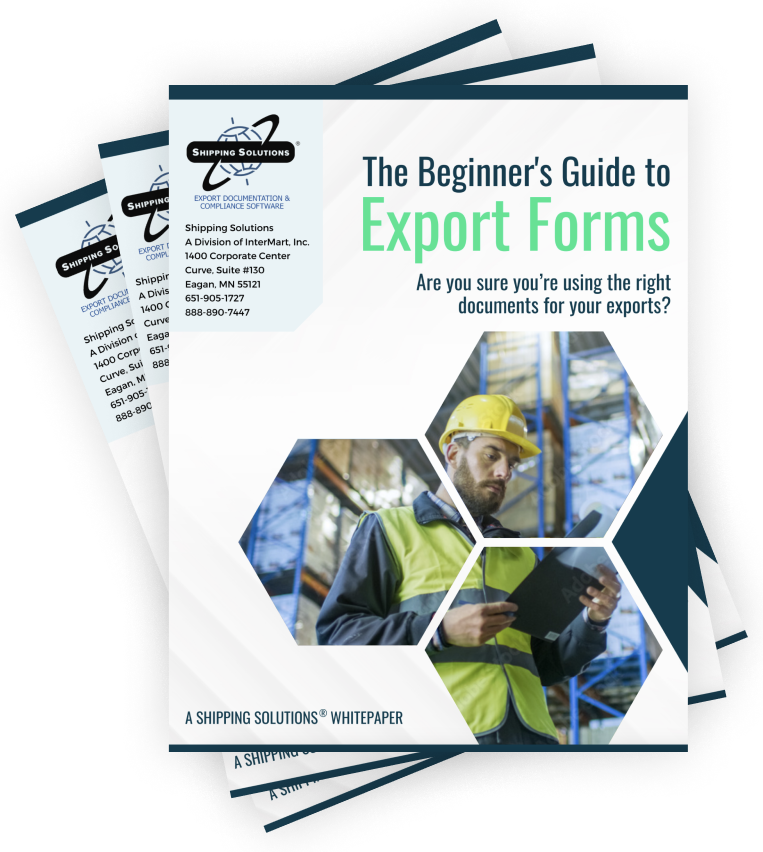The International Trade Blog Export Forms
FAQ: Creating a Certificate of Origin for Your Exports
On: July 7, 2023 | By:  David Noah |
6 min. read
David Noah |
6 min. read
 Since Shipping Solutions unveiled its online portal for generating electronic Certificates of Origin (eCO), several thousand U.S. exporters have registered for free for the service and successfully generated hundreds of Certificates stamped by the American World Trade Chamber of Commerce (AWTCC). By utilizing the eCO portal, these companies have reduced the time and expense they’ve traditionally spent on creating their Certificates.
Since Shipping Solutions unveiled its online portal for generating electronic Certificates of Origin (eCO), several thousand U.S. exporters have registered for free for the service and successfully generated hundreds of Certificates stamped by the American World Trade Chamber of Commerce (AWTCC). By utilizing the eCO portal, these companies have reduced the time and expense they’ve traditionally spent on creating their Certificates.
As we’ve talked with users and prospective users of the eCO service, we’ve compiled a list of several frequently asked questions (FAQ) that we posed to the AWTCC, the Chamber that stamps the Certificates created through the portal:
Q. What is a Certificate of Origin?
A Certificate of Origin form is often required by customs when importing goods into a particular country. Since the exporter is usually the party that sourced the goods and arranged the export, they generally are the party that prepares the Certificate and gets it chamberized when required.
A Certificate is an important document in international trade because it identifies the country of origin of the goods being exported. This information is used to determine the proper duty rates to apply to imports as well as the admissibility of goods in some countries. A Certificate of Origin may also be required to satisfy a letter of credit.
There are generally two types of Certificates of Origin: (1) a free trade agreement Certificate of Origin used to prove the exported goods qualify for reduced duty rates under a trade agreement between two or more countries, and (2) a generic Certificate of Origin for non-trade agreement shipments.
Q. When do I need a Certificate of Origin?
The customs authority in the country of import uses the origin of the goods identified on the Certificate to assess the proper duty rate for those goods. So while a country may not require a Certificate of Origin, it may be beneficial to provide one.
Let’s say you’re shipping something overseas and the standard duty rate on your goods is two percent unless the goods are from the United States, in which case the duty rate is one percent. If the exporter and importer don’t care about the one percent savings in duty rate because they don’t want to bother with a Certificate of Origin, then the exporter typically doesn’t need to provide one. But if the reduction in the duty rate can save them hundreds or thousands of dollars, then they are motivated to generate and provide one.
However, some countries may require a Certificate for every shipment. For example, Kazakhstan is trying to keep Chinese goods out of their country, so they require a Certificate of Origin for every import into their country. There may be other countries that have similar requirements.
Q. How do I get a Certificate of Origin?
Since 1923, Chambers of Commerce are an official body to sign and stamp Certificates of Origin by exporters. This has traditionally required companies to manually create the form, deliver or courier it to a chamber, wait for the appropriate staff member to review and certify the Certificate, send or courier it back to the exporter, and then forward it by international courier to the importer.
Exporters can now generate and submit a Certificate of Origin to a U.S.-based Chamber of Commerce online and get it approved within a single business day. These Certificates can either be printed out on a color printer or sent overnight to the exporter. Either way, the Certificates include the required signatures and stamps by an accredited chamber, are registered with the International Chamber of Commerce, and are recognized and accepted by customs authorities around the world.
You can go online and register for the Certificate of Origin portal for free.
Q. Under what circumstances will a U.S. Chamber of Commerce issue a stamped Certificate of Origin for an export?
The rule is the same for all Chambers around the world. As long as the goods listed on the Certificate of Origin have some logical affiliation with their country, they will issue a Certificate of Origin. For U.S.-based Chambers, the two biggest affiliations are: (1) the exporter is located in the United States, or (2) the goods were produced in the U.S. As long as one of those two things are true, we can issue the document.
Q. Can companies not based in the United States get a Certificate of Origin stamped by a U.S. Chamber of Commerce?
Yes, if the goods listed on the Certificate are made in the United States. See above.
Q. What documentation do you need to get a Certificate of Origin stamped by a Chamber of Commerce?
The U.S. exporter has to provide a copy of the commercial invoice for the shipment showing the country of origin for each item. The Certificate of Origin should list the same country of origin for each item as the invoice. This is usually the only documentation that is required. If there are still some questions, the Chamber may request a letter from the manufacturer confirming that they produced the goods in the country listed.
Q. Do any of the other export documents need to be approved and stamped by the Chamber of Commerce?
There are some circumstances when the country of import requires that the Commercial Invoice get chamberized in addition to the Certificate of Origin. In rare cases, they may require other documents get stamped by the Chamber as well. As a general rule, the importer will have the knowledge to cover this.
Q. What does an exporter do with a stamped Certificate of Origin once they get it from the Chamber?
The Certificate of Origin often accompanies the shipment whether it's in paper or electronic form; whether they print it out or email it. The Certificate goes to the importer, and the importer provides it to show to the customs authority in the country of import so they can determine what duties should apply to the goods in the shipment. The duties are based on where the product is made, which is why the country of origin appears on the Certificate.
Q. When should an exporter apply for a Certificate of Origin?
The standard time frame for requesting a Certificate of Origin is up to three weeks before the goods leave the country of export.
Q. Can an exporter request a Certificate of Origin for items that are already en route to the importer?
Yes. Sometimes exporters apply for a Certificate of Origin while the goods are traveling by vessel to China or some other country and haven’t arrived yet. Sometimes the goods have arrived, haven’t yet cleared customs, and are sitting in storage because the exporter hasn’t provided the proper paperwork. The exporter has up to three weeks after the goods have departed to apply for the Certificate.
Q. What if the exporter requests a Certificate of Origin more than three weeks after it’s departed?
If it’s more than three weeks, the exporter can complete a “retrospective application” for up to three months after the goods have been shipped. In the retrospective application, the exporter is certifying that no other Certificates of Origin were issued for the goods in this shipment and explaining why they didn’t apply for a Certificate during the normal time frame.
Q. What can the exporter do if it has been more than three months since the goods shipped?
At that point a Certificate of Origin shouldn’t be issued. Exceptions may apply.
Q. Are Certificates of Origin issued for specific export shipments, or can you issue a blanket Certificate good for all shipments going to the same consignee?
Most Certificates of Origin are shipment specific. Everything on a particular Certificate of Origin is going to the same consignee, on the same shipment, and at the same time. There are free trade agreement Certificates of Origin like the USMCA Certification of Origin that can be valid for all shipments to a particular consignee within a year, but they don’t generally need to be approved and stamped by a Chamber of Commerce.
Q. How can a Chamber of Commerce know the information being provided is accurate?
It can’t. Chambers verify the information against the support documentation provided.
Q. Can an exporter provide a Certificate of Origin that is not chamberized?
With the exception of most free trade agreement Certificates of Origin, all Certificates of Origin need to be stamped by a Chamber of Commerce to be valid.
Q. What does it mean when the Certificate of Origin needs Apostille certification?
An “apostille” is a form of authentication issued to documents for use in countries that participate in the Hague Convention of 1961. It is a Secretary of State certification of a Notary Public signature. A list of countries that accept apostilles is provided by the US State Department.
Q. What does it mean to get the Certificate of Origin legalized?
In some exports, the final step in the process is sending the Certificate to the consulate of the importing country for it’s stamp. This can only be done after local and state level processing and sometimes must also include the US Department of State or other agency certification. It is recommended that you confer with your chamber or importer for requirements.
Do you still have questions?
If you still have questions about a Certificate of Origin, enter them in the Comments section below, send us an email at info@shipsolutions.com, or give us a call at (651) 905-1727.
This article was first published in 2020 and has been updated to include current information, links and formatting.
Like what you read? Join thousands of exporters and importers who subscribe to Passages: The International Trade Blog. You'll get the latest news and tips for exporters and importers delivered right to your inbox.

About the Author: David Noah
As president of Shipping Solutions, I've helped thousands of exporters more efficiently create accurate export documents and stay compliant with import-export regulations. Our Shipping Solutions software eliminates redundant data entry, which allows you to create your export paperwork up to five-times faster than using templates and reduces the chances of making the types of errors that could slow down your shipments and make it more difficult to get paid. I frequently write and speak on export documentation, regulations and compliance issues.



